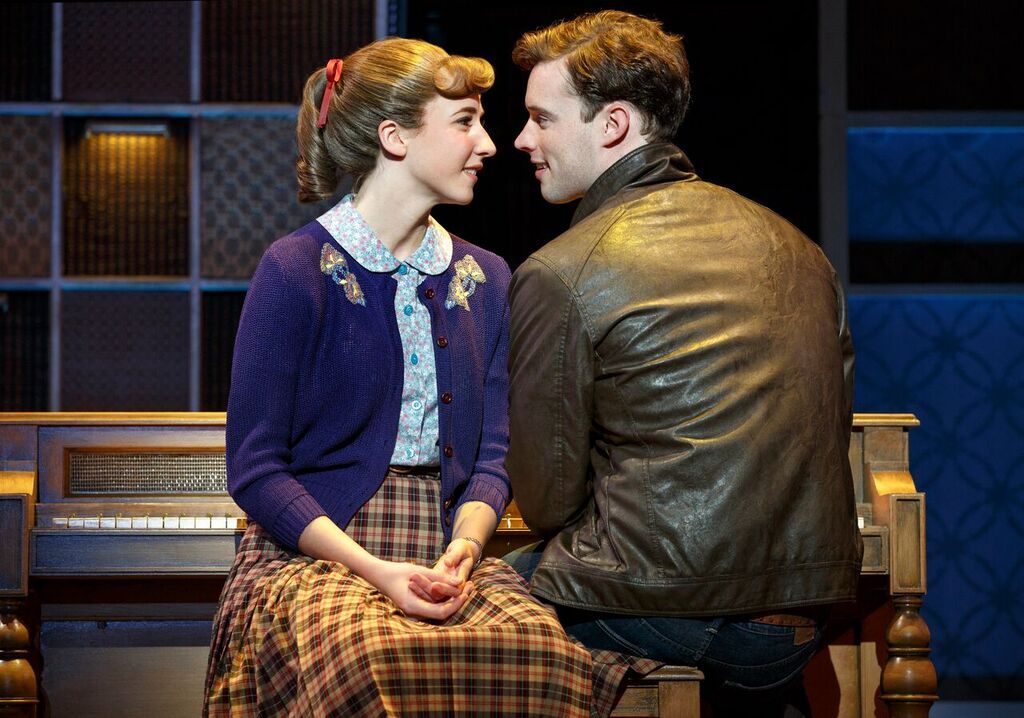Something ‘Beautiful’ about Carole King’s ups and downs
Sometimes when things take a downward turn in life, something beautiful emerges from the dark.
That’s the story of the Broadway fast-paced hit Beautiful: The Carole King Musical that graced the stage at the Hippodrome on Tuesday evening in front of a sold-out crowd.
The musical, which won two Tony Awards in 2014, traces the emotional and comical career of the legendary songwriter/singer whose dream was to “go all the way” with her music.
The play follows the confident and cocky 16-year-old who pushed her way into an audition in front of famed producer Don Kirshner (Curt Bouril) to her 1971 performance at Carnegie Hall, New York. Her mother wasn’t so sure about King’s vocation, advocating that girls should teach music – not perform. But she didn’t listen to her mother and eventually does “go all the way,” when she summons the courage to sing her own tunes and records the legendary Tapestry album.
King born (Carole Klein) has gone on to produce 25 solo albums in span of five decades. She is the Songwriters Hall of Fame and the Rock and Roll Hall of Fame for her songwriting. She is first woman to receive the 2013 Library of Congress Gershwin Prize for Popular Song, and also a 2015 Kennedy Center Honoree. By far, she is considered to be the most successful female artist in the 20th Century, co-writing 118 pop hits on the Billboard Hot 100 between 1955 and 1999.
Julia Knitel stars in the role and nails King’s Brooklyn accent and innocence while brilliantly playing and singing King’s catalog of heart-stopping hits. It’s easy to forget how King’s songwriting skills helped the careers of so many bands like The Drifters, The Shirelles and even Neil Sedaka, who she dated once. But the play reminds everyone that King played a pivotal role is so many musician’s careers.
Make no mistake about it: Knitel can bang on the keys and play an array of songs from three-chord rock tunes to complicated Bach arrangements. Her vocals were bold and sensitive as the band in the pit rocked the foot-tapping audience. She deserved the thunderous applause that often came after Knitel ripped through a parade of hits.

The play could have easily been named after King’s 1971 masterpiece Tapestry — the singer’s soundtrack to her own personal life — filled with love, sorrow and pain. Much like that album the play dips into her emotional roller coaster marriage with first husband and songwriting partner Gerry Goffin played by Andrew Brewer.
Brewer plays Goffin as a complicated character and not the one – dimensional portrait bad husband that could have been the easy way out. He captures the complexity of mood swings, depression and multiple affairs that led Goffin to a nervous breakdown. At times, he comes across as a sympathetic character until he cheats one too many times and the audience applauds King (Knitel) for standing up for herself. But masterfully, his supportive role as a lyrist for King’s hit parade shines through the play.
Knitel’s skillfully embraces King’s passion for Goffin. For he was a key driving force that helped her write and record some of the most memorable songs in the 1960s and 1970s.
Tapestry is well represented in the musical. The songs from this rich and heartfelt album are filled with ups and downs that blend together to provide a peak into King’s soul and troubled marriage. That album won four Grammys and sold more than 25 million records worldwide. The songs, You Got a Friend, So Far Away, and (You Make Me Feel Like) Natural Woman paved the way for King’s superstar status.

Much like the play, King’s rise to the top was a competitive fight with an emotional toll that carried her through the turbulent 1960s. She competed with songwriters Barry Mann (Ben Fankhauser) and Cynthia Weil (Erika Olson) who produced an amazing catalog of songs for bands like the Righteous Brothers and more. Fankhauser and Olson provided some great comic relief throughout the course of the play including noting that King and Goffin are their best friends, albeit “they are their only friends.”
The play hints at the 1960s cultural revolution – but fails to provide a hard look at the Vietnam War, Civil Rights, and women’s issues, which King would later embrace during her career. (A big supporter of Hillary Clinton, she performed at the Democratic National Convention in Philadelphia.)
Goffin wanted more than just to produce meaningless but feel-good pop hits and struggled with being constrained to writing a three-minute tune. But King just wanted to have some “fun” writing dance songs like Locomotion during the early days. Brewer captures those moments of frustration and never once overplays the drama while Knitel’s character beams with innocence that makes the couple charming on stage.
In one scene, Brewer’s Goffin character sums his frustration up after he co-writes with King, Pleasant Valley Sunday. He discovers that the Monkees – not even a real band – will be singing the song for a comedy show.
When Kirshner (played by Bouril) tries to convince Goffin that giving the song to the TV band is a good career move because he says the Monkees are just like the Beatles, it brought a collective groan from the audience.
Brewer’s Goffin character stomps off stage, saying his career has come down to producing music for a “sitcom.”
The insinuation is that other bands are producing meaningful music with artists delivering strong messages about the times and he is falling short. That’s about as far as the play gets to dealing with what was really happening on the streets during that time period.
The play skips over sex and drugs, though there are a few hints of people smoking dope and a short scene of a strip poker game that ends because it’s out of the singer’s comfort zone as well as King getting pregnant prior to marriage. However, the play just focuses on rock ‘n’ roll, which during that period seems a little naked without the other elements.
The play also skips over Kings’ three other marriages – to Charles Larkey, Rick Evers and Rick Sorenson – albeit they came much later than the time period the play covered. (In her 2011 A Natural Woman, King claimed she had been physically abused by Evers, who died of a cocaine overdose after they separated in 1978).
King’s long-time friend James Taylor who played a pivotal role on the Tapestry album with his soothing harmony and finger-style guitar picking is not even mentioned in this script. Audience members leaving the theatre even asked the question: “Where is James Taylor?” Taylor might be asking the same question.
Regardless of JT being AWOL in the play, the audience jumped onto a rousing two-hour, 20-minute ride that is guaranteed to end with crazy desire to break out Tapestry for a spin. And ironically, Tapestry is the type of thoughtful music that Goffin sought to produce.
It took a harsh breakup for King to find confidence, stand up for herself and record the beauty of her soul in Tapestry. She didn’t hold back in that album even painfully recording Natural Woman – a love song about Goffin. In Tapestry, she showed us something beautiful and moving. That’s really what this play is about. And you will definitely leave the show feeling the earth move from under your feet.
The show will be in Baltimore until Jan. 29 before it hits the road. Tickets can be purchased online.

Timothy W. Maier is the founder of Baltimore Post-Examiner LLC, which runs the Baltimore and Los Angeles Post-Examiner websites. He started out writing music, fiction and poetry and then turned to news writing, where he spent the past three decades at news organizations in Wisconsin, Maryland and Washington, D.C. He was the managing editor at the Baltimore Examiner newspaper. He now spends time with his family, dog, guitar and riding his motorcycle across the country.
